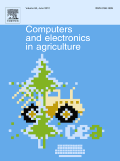
COMPUTERS AND ELECTRONICS IN AGRICULTURE
Scope & Guideline
Harnessing Technology for Sustainable Farming
Introduction
Aims and Scopes
- Precision Agriculture:
The journal covers advancements in precision agriculture technologies, including remote sensing, GPS, and IoT applications that optimize farming practices and resource management. - Agricultural Robotics:
Research on robotic systems for tasks such as planting, harvesting, and monitoring crops is a core focus, exploring how automation can improve efficiency and reduce labor costs. - Data Analytics and Machine Learning:
The journal emphasizes the use of machine learning and data analytics for modeling agricultural processes, predicting outcomes, and improving decision-making in farming. - Crop and Soil Sensing Technologies:
Innovations in sensor technologies for monitoring soil health, crop growth, and environmental conditions are highlighted, showcasing methods that enhance data collection and real-time analysis. - Sustainable Practices:
Research aimed at promoting sustainable agricultural practices through technology, including water management, pest control, and resource-efficient farming methods, is a key area of interest. - Agricultural Informatics:
The journal explores the integration of information systems in agriculture, including the use of big data, cloud computing, and smart farming technologies.
Trending and Emerging
- Artificial Intelligence and Deep Learning:
There is a significant increase in research utilizing AI and deep learning techniques for crop monitoring, disease detection, and yield prediction, reflecting the growing integration of these technologies in agriculture. - Remote Sensing and UAV Technology:
The use of drones and remote sensing technologies for precision agriculture is rapidly trending, with numerous studies focusing on their applications in crop health assessment and environmental monitoring. - Sustainable Agricultural Practices:
Research on sustainable agriculture practices, including resource conservation and eco-friendly pest management, is gaining momentum as the sector increasingly prioritizes sustainability. - IoT and Smart Farming Solutions:
The emergence of IoT technologies in agriculture is a trending topic, with research focusing on connected devices that enhance farm management and operational efficiency. - Data-Driven Decision Making:
There is an emphasis on the use of big data and analytics for making informed decisions in agriculture, reflecting a shift towards data-centric farming practices. - Integration of Blockchain Technology:
The application of blockchain for traceability and transparency in the agricultural supply chain is an emerging theme, driven by the demand for food safety and quality assurance.
Declining or Waning
- Traditional Farming Techniques:
There is a noticeable decline in research focused on traditional farming methods, as the emphasis shifts towards technologically advanced practices and automation. - Manual Labor in Agriculture:
Research topics related to manual labor in farming are waning as the industry increasingly adopts robotic solutions and automated systems. - Basic Agricultural Equipment:
There has been a decrease in publications related to conventional agricultural equipment, with more focus on smart machinery and integrated systems. - Static Data Analysis:
Static methods of data analysis are becoming less common, with a shift towards dynamic, real-time data processing and predictive analytics. - General Agricultural Education:
While foundational agricultural education remains important, the journal has seen fewer articles focusing on traditional educational approaches, favoring those that incorporate technology and innovation.
Similar Journals

Revista Ciencia Agronomica
Connecting research and practice in agricultural sciences.Revista Ciencia Agronomica is a leading open access journal published by the Universidade Federal do Ceará, Departamento de Geociências, dedicated to advancing the field of agricultural sciences. Established in 2008, the journal has emerged as a significant platform for the dissemination of original research and innovative advancements in areas including agronomy, horticulture, and soil science, with a dedicated convergence of years extending to 2025. With an impactful presence in academic circles—ranking in Q3 for Agronomy and Crop Science and Soil Science and Q2 for Horticulture in 2023—this journal provides vital insights for researchers and practitioners alike. Although specific HIndex metrics are currently unavailable, the journal's Scopus rankings attest to its relevance, placing it in the 52nd, 44th, and 43rd percentiles across multiple pertinent categories. Since transitioning to an open access model in 2010, Revista Ciencia Agronomica has committed to maximizing the reach and impact of its published work, thereby ensuring valuable contributions to global agricultural knowledge.
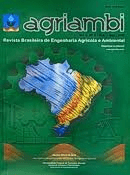
Revista Brasileira de Engenharia Agricola e Ambiental
Pioneering Research in Agricultural and Environmental SciencesRevista Brasileira de Engenharia Agricola e Ambiental, published by the Universidade Federal de Campina Grande, serves as a pivotal platform for researchers and professionals in the fields of agricultural and biological sciences, agronomy, and environmental engineering. With an open-access policy since 2000, this journal aims to foster global dissemination of innovative research and practices, ensuring that high-quality findings are accessible to all. Operating in Brazil, it holds notable rankings, including Q2 in the categories of Agricultural and Biological Sciences (miscellaneous) and Agronomy and Crop Science, indicating its strong academic impact and influence within these fields. As of 2023, it ranks #68 out of 193 in Agricultural and Biological Sciences and #188 out of 406 in Agronomy and Crop Science, representing its commitment to advancing scientific knowledge. The journal primarily focuses on publishing studies that address challenges in agricultural engineering and environmental sustainability, making it an essential read for students, researchers, and professionals who are dedicated to innovation and excellence in these dynamic fields.
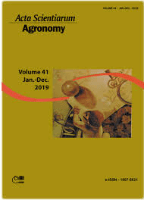
ACTA SCIENTIARUM-AGRONOMY
Driving excellence in agronomy for a thriving planet.ACTA SCIENTIARUM-AGRONOMY is a prestigious, peer-reviewed journal published by UNIV ESTADUAL MARINGA, PRO-REITORIA PESQUISA POS-GRADUACAO, focusing on advanced research in the field of agronomy and crop science. Since its inception as an Open Access journal in 2007, it has significantly contributed to disseminating high-quality research, allowing unrestricted access to its content for a global audience. Operating from Brazil, the journal holds a notable Q2 category ranking in Agronomy and Crop Science as of 2023, validating its importance within the academic community. The journal’s Scopus ranking positions it in the 49th percentile among Agricultural and Biological Sciences, indicating a robust foundation for impactful research. With a commitment to innovation and scientific excellence, ACTA SCIENTIARUM-AGRONOMY aims to provide researchers, professionals, and students with vital insights that drive forward our understanding of agriculture and its environmental implications.
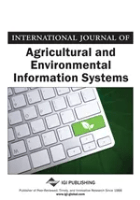
International Journal of Agricultural and Environmental Information Systems
Transforming Data into Sustainable SolutionsInternational Journal of Agricultural and Environmental Information Systems, published by IGI Global, is a leading platform for scholarly discourse bridging the domains of agriculture, environmental science, and information systems. With its ISSN 1947-3192 and E-ISSN 1947-3206, this esteemed journal has been pivotal in tackling key information challenges within these crucial fields since its inception in 2010, and it continues to evolve until 2024. Featuring articles ranked in the Q3 category for Information Systems based on Scopus metrics— where it proudly stands at Rank #105 out of 394—this journal occupies a significant position in advancing knowledge dissemination and applied research. The open access option broadens the reach of its valuable content, making it accessible to a diverse audience. The journal's objective is to foster interdisciplinary research and innovations that enhance sustainability in agricultural practices and environmental management. By subscribing to the latest studies and innovations, researchers, professionals, and students can leverage the insights published in the International Journal of Agricultural and Environmental Information Systems to significantly contribute to their fields and foster better decision-making in environmental stewardship and agricultural advancements.

APPLIED ENGINEERING IN AGRICULTURE
Exploring Innovative Pathways for Modern Agricultural Challenges.APPLIED ENGINEERING IN AGRICULTURE is a peer-reviewed journal published by the American Society of Agricultural and Biological Engineers, dedicated to advancing the field of agricultural engineering through the dissemination of high-quality research. With an ISSN of 0883-8542 and an e-ISSN of 1943-7838, this journal has been a key resource since its inception in 1985, serving as a vital platform for scholars and practitioners to share innovative ideas and practical solutions that enhance productivity and sustainability in agricultural practices. The journal is ranked in the Q3 category for Engineering (miscellaneous) as of 2023, and is positioned within the 43rd percentile of the general engineering rankings in Scopus. While not currently an open-access journal, APPLIED ENGINEERING IN AGRICULTURE remains crucial for researchers and professionals looking to explore diverse engineering solutions that address the complexities of modern agriculture, making it an invaluable resource for anyone committed to improving agricultural systems through engineering advancements.
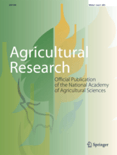
AGRICULTURAL RESEARCH
Fostering collaboration in agronomy and food science.AGRICULTURAL RESEARCH is a distinguished academic journal published by SPRINGER INDIA, focusing on the dynamic fields of Agronomy, Crop Science, and Food Science. With an ISSN of 2249-720X and E-ISSN of 2249-7218, this journal has established itself as a valuable resource for researchers, professionals, and students dedicated to advancing agricultural knowledge and practices. The journal is recognized in the 2023 Scopus Rankings, achieving commendable quartile positions, including Q2 in Agronomy and Crop Science and Plant Science, as well as Q3 in Food Science, indicating its influential presence in the academic community. AGRICULTURAL RESEARCH aims to disseminate cutting-edge research findings, innovative methodologies, and comprehensive reviews, fostering collaboration and discussion among scholars in Switzerland and beyond. Through its commitment to scholarly excellence, this journal is pivotal in addressing contemporary challenges in agriculture, ensuring sustainability, and enhancing food security for the future.

Transactions of the ASABE
Pioneering research for a sustainable agricultural landscape.Transactions of the ASABE is a premier journal published by the American Society of Agricultural and Biological Engineers, specializing in innovative research and practical applications in the fields of agricultural and biological engineering. With an ISSN of 2151-0032 and E-ISSN 2151-0040, this journal has established a vital niche in disseminating high-quality scholarly content that addresses the complex challenges faced in agriculture and biological systems. The journal operates under an open access model, facilitating broad dissemination of research findings to a global audience. This commitment to accessibility is reflected in its coverage of diverse topics, including agriculture, soil science, food science, and environmental engineering. Although the journal's coverage in Scopus was discontinued in 2021, it once ranked among the top in its categories, indicating its significant contribution to advancing knowledge in these essential fields. Researchers, practitioners, and students are encouraged to engage with the Transactions of the ASABE to stay abreast of developments and foster collaboration in promoting sustainable engineering solutions.

Artificial Intelligence in Agriculture
Unleashing the Power of AI for Agricultural ExcellenceArtificial Intelligence in Agriculture is a premier open-access journal dedicated to advancing the application of artificial intelligence technologies in the agricultural sector. Published by KEAI Publishing Ltd in China, this journal has rapidly gained recognition since its inception in 2019, boasting an impressive impact factor highlighted by its Q1 rankings across multiple categories in the 2023 Scopus metrics. Aimed at researchers, practitioners, and students alike, it provides a vital platform for disseminating innovative research and practical applications that bridge the gap between AI and agriculture. With a focus on enhancing productivity through cutting-edge AI methodologies, the journal encourages submissions that address the multifaceted challenges in agricultural practices. Whether you are looking to publish your work or explore the latest findings, Artificial Intelligence in Agriculture is an essential resource for anyone committed to fostering sustainable agricultural advancements through technology.
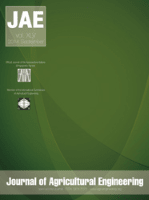
Journal of Agricultural Engineering
Bridging Theory and Practice in Agricultural EngineeringThe Journal of Agricultural Engineering, published by PAGEPRESS PUBL, is a vital resource for researchers, professionals, and students engaged in the fields of agricultural technology and engineering. With an ISSN of 1974-7071 and an E-ISSN of 2239-6268, this Open Access journal has been disseminating valuable research since 2007, making significant strides in the accessibility of research findings. Based in Italy, the journal aims to bridge the gap between theoretical approaches and practical applications in agricultural engineering, focusing on innovative solutions to contemporary challenges in the sector. The journal has achieved respectable Scopus rankings, including #192/384 in Industrial and Manufacturing Engineering, highlighting its relevance and contribution to the field despite its Q4 and Q3 quartile rankings in related categories. The convergence of knowledge from 2012 to 2024 captures an evolving perspective on agricultural engineering practices, enhancing its appeal for those striving to advance the discipline. As an open-access platform, the journal ensures that cutting-edge research is readily available, fostering collaboration and knowledge sharing in a rapidly changing world.

AgriEngineering
Transforming Agriculture with Open Access InsightsAgriEngineering is a premier Open Access journal, published by MDPI, focusing on innovative research across the disciplines of agronomy, horticulture, food science, and engineering. Established in 2019 and headquartered in Basel, Switzerland, this journal has rapidly gained recognition, evidenced by its robust performance in the Scopus rankings and its positioning in Q1 and Q2 quartiles of key categories, including Horticulture and Agronomy. With a commitment to disseminating high-quality research that advances agricultural engineering practices, AgriEngineering provides a platform for researchers, professionals, and students to explore cutting-edge developments aimed at enhancing food production systems and sustainability. Its Open Access model ensures wide-reaching accessibility to vital research outcomes, empowering global collaboration and innovation in the field. For more information on submission and access, you can visit the AgriEngineering website.